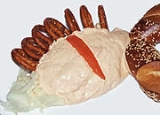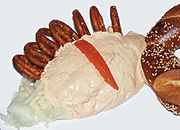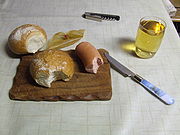
Strausse
Encyclopedia
A Strausse or Strausswirtschaft (also Strauße or Straußwirtschaft) is a type of wine tavern in winegrowing areas of German
-speaking countries that is only open during certain times of the year. Typically it is a pub run by winegrowers and winemakers themselves, in which they sell their own wine directly to the public. The food served needs to be simple, regional cold dishes. Other expressions like Besenwirtschaft and Besenschänke ("broom pub"), Rädlewirtschaft ("cyclists' pub") as well as Hecken- or Häckerwirtschaft are also common.
to state but they are in general agreement on certain essential points (see "Legal aspects" below).
The kinds of locations in which a Strausswirtschaft can be found can vary considerably. Besides ones funished like ordinary pubs there are also simple barns where benches and tables have been temporarily set up to accommodate guests. In earlier decades some winegrowers even cleared their flats or the stables to run such a tavern. In Austria
this kind of pub is called a "Buschenschank" or "Heuriger". The name is derived from a bar or post to which a so-called "Föhrenbusch" or a "Reisigbesen" (a kind of besom or broom) was attached. This helps to explain another expression associated with the Strausswirtschaft: "Ausg'steckt is'" ("It is attached"). By attaching the bar outside, the pub owner was informing the tax collector about the pub's tax liability. The "Buschenschank" and the expression "Ausg'steckt is'" can be traced back to a regulation by Empress Maria Theresia
.
is often mentioned as the historical standard for the Strausswirtschaft. It enabled winemakers to sell their own products free of business tax. The Strausswirtschaft (Strauss – Ger. bunch of flowers; Wirtschaft – Ger. pub, inn) had to be marked as such by a bunch of flowers put up at the entrance.
Typical dishes offered are rather simple and rich. Regional specialities are for instance:


Elaborate dishes are not allowed.
Although Strausswirtschaften do not need a licence, there are certain laws they have to follow. Among other things, a Strausswirtschaft is not allowed to offer lodging or engage in trade. Food and beverage must be served at the place of production. It is forbidden to rent any extra facilities for serving food and beverage.
The following rules need to be respected:
German language
German is a West Germanic language, related to and classified alongside English and Dutch. With an estimated 90 – 98 million native speakers, German is one of the world's major languages and is the most widely-spoken first language in the European Union....
-speaking countries that is only open during certain times of the year. Typically it is a pub run by winegrowers and winemakers themselves, in which they sell their own wine directly to the public. The food served needs to be simple, regional cold dishes. Other expressions like Besenwirtschaft and Besenschänke ("broom pub"), Rädlewirtschaft ("cyclists' pub") as well as Hecken- or Häckerwirtschaft are also common.
Characterization
A Strausswirtschaft is essentially understood to be a winemaker serving his own wine on his own premises. These seasonal inns are not subject to normal business laws and are thus not obliged to have a licence or to pay extra taxes. They must, however, fulfil certain conditions instead. These conditions vary from stateStates of Germany
Germany is made up of sixteen which are partly sovereign constituent states of the Federal Republic of Germany. Land literally translates as "country", and constitutionally speaking, they are constituent countries...
to state but they are in general agreement on certain essential points (see "Legal aspects" below).
The kinds of locations in which a Strausswirtschaft can be found can vary considerably. Besides ones funished like ordinary pubs there are also simple barns where benches and tables have been temporarily set up to accommodate guests. In earlier decades some winegrowers even cleared their flats or the stables to run such a tavern. In Austria
Austria
Austria , officially the Republic of Austria , is a landlocked country of roughly 8.4 million people in Central Europe. It is bordered by the Czech Republic and Germany to the north, Slovakia and Hungary to the east, Slovenia and Italy to the south, and Switzerland and Liechtenstein to the...
this kind of pub is called a "Buschenschank" or "Heuriger". The name is derived from a bar or post to which a so-called "Föhrenbusch" or a "Reisigbesen" (a kind of besom or broom) was attached. This helps to explain another expression associated with the Strausswirtschaft: "Ausg'steckt is'" ("It is attached"). By attaching the bar outside, the pub owner was informing the tax collector about the pub's tax liability. The "Buschenschank" and the expression "Ausg'steckt is'" can be traced back to a regulation by Empress Maria Theresia
Maria Theresa of Austria
Maria Theresa Walburga Amalia Christina was the only female ruler of the Habsburg dominions and the last of the House of Habsburg. She was the sovereign of Austria, Hungary, Croatia, Bohemia, Mantua, Milan, Lodomeria and Galicia, the Austrian Netherlands and Parma...
.
Origins
The enactment "Capitulare de villis vel curtis imperii" by CharlemagneCharlemagne
Charlemagne was King of the Franks from 768 and Emperor of the Romans from 800 to his death in 814. He expanded the Frankish kingdom into an empire that incorporated much of Western and Central Europe. During his reign, he conquered Italy and was crowned by Pope Leo III on 25 December 800...
is often mentioned as the historical standard for the Strausswirtschaft. It enabled winemakers to sell their own products free of business tax. The Strausswirtschaft (Strauss – Ger. bunch of flowers; Wirtschaft – Ger. pub, inn) had to be marked as such by a bunch of flowers put up at the entrance.
Typical dishes offered are rather simple and rich. Regional specialities are for instance:


- SchlachtplatteSchlachtplatte-Track listing:# Voruss – 3:13# Scharlachrot – 4:24# Am Schärme – 2:24# Bälpmoos – 4:42# Schuumbad 1 – 1:27# Salz & Schtahl – 1:52# Padänt Ochsner – 1:14# No geit's – 2:03# Schuumbad 2 – 1:34# Mittschiffs – 2:25# Pfeuti – 3:26# Domino – 1:52...
(black pudding, liverwurstLiverwurstThe German , that translates literally as "liver sausage," is the typical sausage served in Germany, Austria, Hungary, Serbia, Slovenia, the Netherlands, Finland, Sweden and Romania . Liverwurst normally contains pigs' livers, rather than calves' livers and also contains veal...
and sauerkrautSauerkrautSauerkraut , directly translated from German: "sour cabbage", is finely shredded cabbage that has been fermented by various lactic acid bacteria, including Leuconostoc, Lactobacillus, and Pediococcus. It has a long shelf-life and a distinctive sour flavor, both of which result from the lactic acid...
) - Spundekäs in RhinehesseRheinhessen (wine region)Rheinhessen is the largest of 13 German wine regions for quality wines with under cultivation in 2008. Named for the traditional region of Rhenish Hesse, it lies on the left bank of the River Rhine between Worms and Bingen in the federal state of Rhineland-Palatinate...
and the RheingauRheingau (wine region)Rheingau is one of 13 German wine regions for quality wines . Named for the traditional region of Rheingau , the wine region is situated in the state of Hesse, where it makes up part of the Rheingau-Taunus-Kreis administrative district...
area - Weck, Worscht un Woi in Rhinehesse, Rheingau and Pfalz
- Pfälzer SaumagenSaumagenSaumagen is a German dish popular in the Palatinate. The name means "sow's stomach". The dish is similar to a sausage in that it consists of a stuffed casing; however, the stomach itself is integral to the dish. It isn't as thin as a typical sausage casing...
(Palatinate sow’s stomach) - MaultascheMaultascheMaultaschen are a Swabian specialty food, consisting of an outer layer of pasta dough with a filling traditionally made of minced meat, smoked meat, spinach, bread crumbs and onions and flavored with various herbs and spices...
n (Swabian pockets) with potato salad - Winzerteller (sausage & cheese dish)
- WurstsalatWurstsalatWurstsalat is a tart sausage salad prepared with vinegar, oil and onions. It is normally made from a sort of boiled sausage like lyoner, stadtwurst, regensburger or extrawurst...
(sausage salad) - ZwiebelkuchenZwiebelkuchenZwiebelkuchen, which literally means onion cake in the German language, is either a one-crust pie made of steamed onions, diced bacon, cream, and caraway seed on a yeast dough or a leavened dough that is particularly popular in the German winegrowing regions mostly of Rhenish Hesse, the Palatinate,...
(onion pie) - Flammkuchen (Tarte flambéeTarte flambéeTarte flambée is an Alsatian dish composed of bread dough rolled out very thin in the shape of a rectangle or circle, which is covered with fromage blanc or crème fraîche, thinly sliced onions and lardons...
) - BratwurstBratwurstA bratwurst is a sausage usually composed of veal, pork or beef. The plural in German is Bratwürste....
and KrautKrautKraut is a German word recorded in English from 1918 onwards as a derogatory term for a German, particularly a German soldier during World War I and World War II. Its earlier meaning in English was as a synonym for sauerkraut, a traditional German and central European food.- Etymological... - Blaue Zipfel (in FranconiaFranconiaFranconia is a region of Germany comprising the northern parts of the modern state of Bavaria, a small part of southern Thuringia, and a region in northeastern Baden-Württemberg called Tauberfranken...
) - Dressed CamembertCamembert (cheese)Camembert is a soft, creamy, surface-ripened cow's milk cheese. It was first made in the late 18th century in Normandy in northern France.-Production:...
(in Franconia) - Kuhkäs (in Franconia - a cheese dish)
Elaborate dishes are not allowed.
Legal aspects
Almost nowhere are Strausswirtschaften considered restaurants, which means that owners do not need a concession. Nevertheless, the trade office needs to be notified in advance about the period during which the Stausswirtschaft intends to sell food and drink.Although Strausswirtschaften do not need a licence, there are certain laws they have to follow. Among other things, a Strausswirtschaft is not allowed to offer lodging or engage in trade. Food and beverage must be served at the place of production. It is forbidden to rent any extra facilities for serving food and beverage.
The following rules need to be respected:
- Selling food and drink is limited to four months a year
- The opening times can be divided into two periods.
- There is a maximum capacity of 40 seats. There are no rules, however, dictating the number of people permitted to squeeze in on the benches or likewise the number of people allowed to stand around drinking their wine. Exception: In Rhineland-PalatinateRhineland-PalatinateRhineland-Palatinate is one of the 16 states of the Federal Republic of Germany. It has an area of and about four million inhabitants. The capital is Mainz. English speakers also commonly refer to the state by its German name, Rheinland-Pfalz ....
there is no limit on the number of seats. - A minimum of hygiene has to be considered and is subject to public control
- Strausswirtschaften are only allowed to serve very simple dishes. Hot sausages and loin ribs with sauerkraut are given as such an example in the regulations as well as coffee and cake.
- Beer and other alcoholic beverages (excluding wine) must not be served. Home distilled spirits, however, are allowed. Alongside wine and/or cider at least one non-alcoholic drink has to be offered. Tapwater is explicitly excluded.

